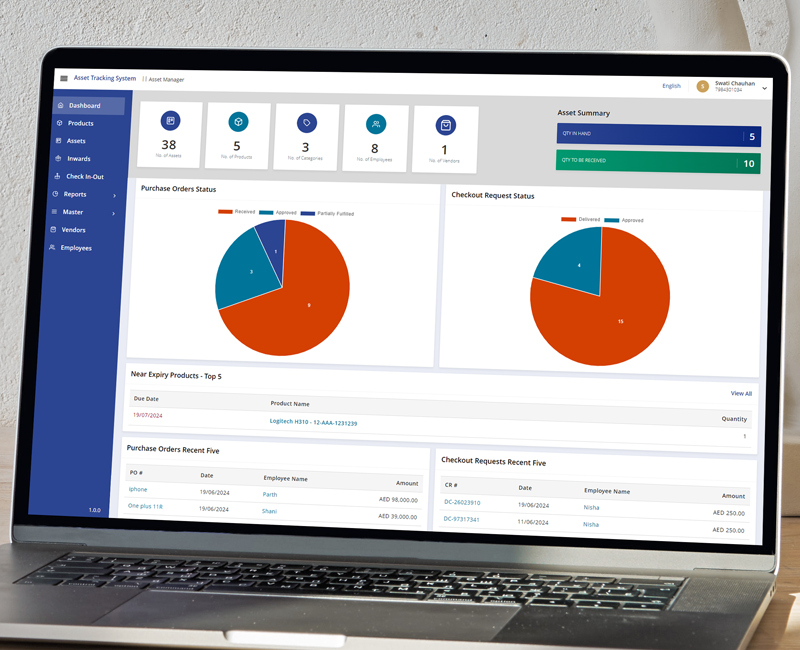Table of contents
- The Role of Digital Transformation in the Oil & Gas Industry
- The Major Challenges Faced by the Oil & Gas Industry
- The Must-Follow Digital Technology Trends in the Oil and Gas Industry
- Futuristic Solutions for Digitalization in the Oil and Gas Industry
- 6 Reasons to Implement Digital Transformation in the Oil and Gas Industry
- Guide to Leveraging Digitalization in Oil & Gas Industry
- Conclusion:
- Frequently Asked Questions
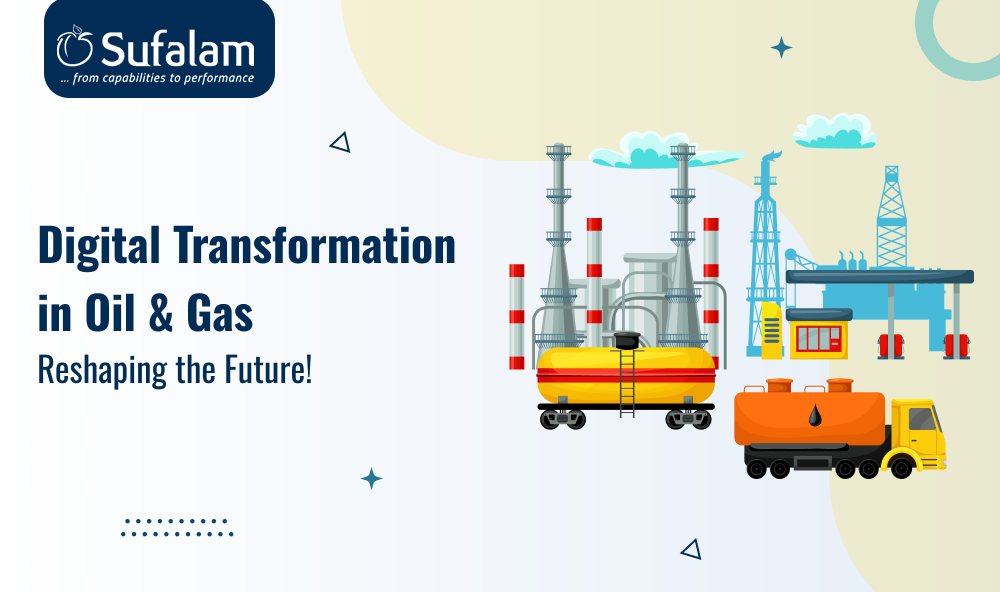
The oil and gas industry has relied on fortitude, intuition, and heavy machinery for more than a century to extract crude oil from the earth's surface. However, the modern era is currently characterized by a new trend toward digitalization.
In the ever-evolving landscape of the oil and gas industry, digital transformation has emerged as a pivotal force reshaping operational practices and driving unprecedented efficiencies.
In light of this, we will explore the multifaceted landscape of digital transformation in the oil and gas industry. From identifying key challenges to uncovering emerging trends and outlining actionable strategies, this guide has it all. So, without further ado - let’s delve in!
The Role of Digital Transformation in the Oil & Gas Industry
Digital transformation is more than just a buzzword; it's a strategic imperative for oil and gas companies looking to stay ahead in an increasingly competitive market. According to the survey, 70% of oil and gas industry leaders believe enterprise-wide change is integral to being competitive in the marketplace.
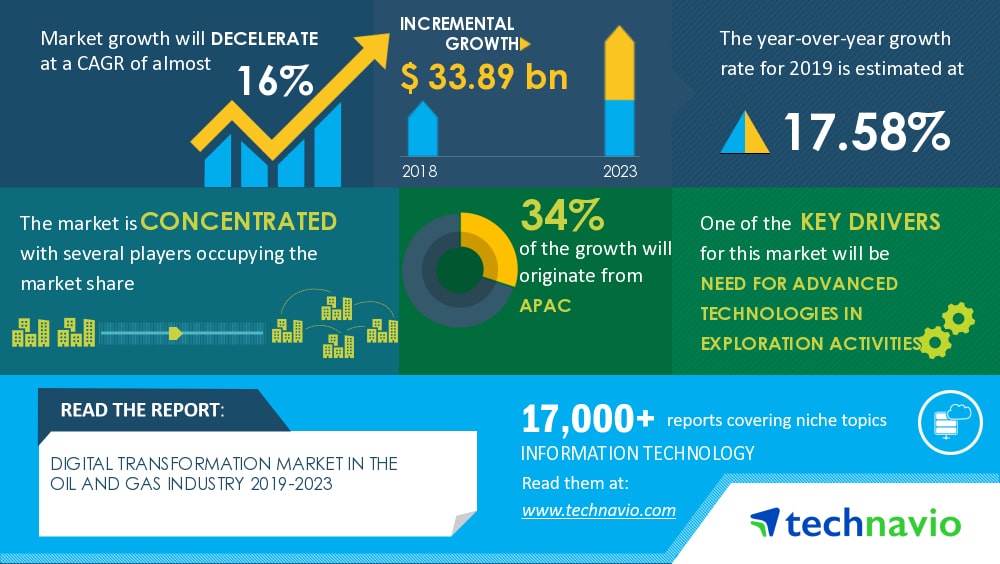
Source: technavio
Digital transformation in the oil and gas industry entails integrating emerging technologies such as cloud services, automation, IoT, and analytics across business activities. It transforms how energy companies operate and service customers from the oilfield to the pump, providing simpler operations and better experiences.
Sufalam Technologies is a leading digital transformation company that is key to the digitalization of the oil and gas industry. We offer customized AI & machine learning solutions that leverage data, automate processes, and drive innovation.
The Major Challenges Faced by the Oil & Gas Industry
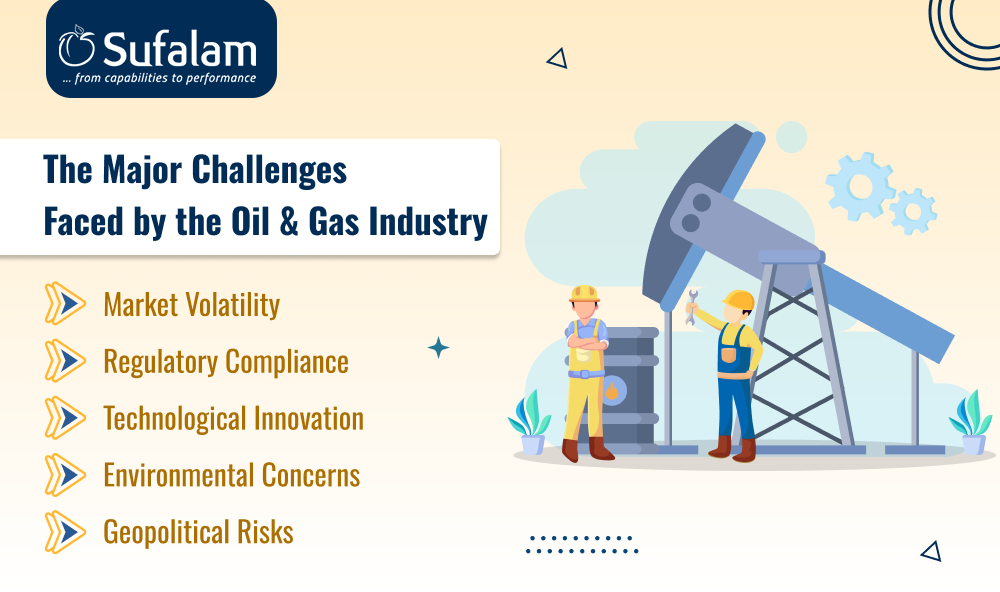
Despite its inherent resilience, the oil and gas industry faces many challenges, from volatile market conditions to regulatory pressures and environmental concerns. The following are some challenges to look after.
Market Volatility
The oil and gas industry experiences frequent fluctuations in global oil prices due to various factors such as geopolitical tensions, economic conditions, and supply-demand imbalances, which can greatly affect profitability and decision-making processes.
Regulatory Compliance
The regulatory environment that oil and gas companies operate in is complicated, with rules pertaining to safety, the environment, and licensing. It takes a lot of resources to ensure compliance with these regulations, and breaking them can lead to fines and reputational harm.
Technological Innovation
Rapid advancements in technology, such as automation and data analytics, are reshaping the industry. However, integrating these technologies requires significant investment and organizational restructuring, presenting challenges for companies.
Environmental Concerns
The increased awareness of environmental issues has put pressure on the industry to reduce its carbon footprint. Companies are under review for issues such as emissions, water consumption, and habitat preservation, prompting investments in cleaner technologies.
Geopolitical Risks
The fluctuation of prices can be caused by supply chain disruptions brought on by political instability, trade disputes, and conflicts in oil-producing regions. A politically unstable area also poses security risks and makes it difficult for investments and collaborations.
The Must-Follow Digital Technology Trends in the Oil and Gas Industry

As the oil and gas industry continues to evolve in the digital age, embracing futuristic trends driven by advanced technologies is crucial to fostering creativity, effectiveness, and long-term viability. The digital technology trends in the oil and gas industry listed below will help them to cope with ongoing challenges.
Immersive AR and VR Experiences
AR and VR technologies are revolutionizing training, maintenance, and operations in the oil and gas industry. AR-enabled smart glasses and VR simulations provide immersive training experiences for personnel, allowing them to practice complex procedures in a safe and controlled environment. Additionally, AR overlays can provide real-time information and instructions to field technicians, improving efficiency and reducing errors during maintenance and repair activities.
Revolutionary AI & ML
Using AI and ML solutions in the Oil and Gas industry can revolutionize a wide range of processes. These technologies help optimize drilling operations, predict equipment failures, and manage reservoirs more effectively. To seamlessly integrate digitalization in Oil and Gas industry, hire dedicated developers from top digital transformation companies.
Blockchain-Oriented Logistics Management
Oil and gas industries can manage transactions, contracts, and supply chain operations with blockchain technology. Blockchains increase transparency, reduce fraud, and streamline processes such as royalty payments, land rights management, and energy commodity trading by providing a decentralized ledger for recording and verifying transactions.
Internet of Things (IoT) Sensors
The Internet of Things has the power to revolutionize digital transformation in the oil and gas industry by establishing a large network of interconnected devices and sensors. These smart sensors offer real-time monitoring, facilitating proactive maintenance and saving downtime. Businesses can gain enhanced visibility into their operations via IoT, resulting in more effective choice-making and resource use.
Cloud & Edge Computing
In the oil and gas industry, cloud computing and edge computing play an important role. In contrast to cloud computing, edge computing brings computational resources closer to the data source in order to address the challenges of data processing and latency. When it comes to digitalization in the oil and gas industry, both contribute to improved operational agility and efficiency.
5g Industrial Connectivity
Industrial 5G allows for remote operations and control, reducing the need for human presence on-site. This helps operators to remotely monitor and operate critical infrastructure, such as pipelines and drilling equipment, which leads to improved operational efficiency & safety measures. Embracing the potential of digital technology in oil and gas, Industrial 5G provides as a foundation for improving operational capabilities.
Futuristic Solutions for Digitalization in the Oil and Gas Industry
Embracing the following solutions will be essential for O&G companies to thrive in the digital era and contribute to a more sustainable energy future.
Integrated Asset Management Systems: Streamline asset management with digital platforms for real-time monitoring and predictive maintenance.
Smart Field Development Planning: Improve plans for field development with sophisticated simulation and modelling tools.
Remote Operations Centers: To improve efficiency and safety, set up centralized control centers for remote management.
Supply Chain Management: Digitize supply chains using digital technology trends in the oil and gas industry like blockchain to promote sustainability and transparency.
Automation and Robotics: Use self-governing robots and drones to conduct safer and more effective fieldwork.
Digital Workforce Training: Make use of VR and AR for immersive training and upskilling programs.
6 Reasons to Implement Digital Transformation in the Oil and Gas Industry
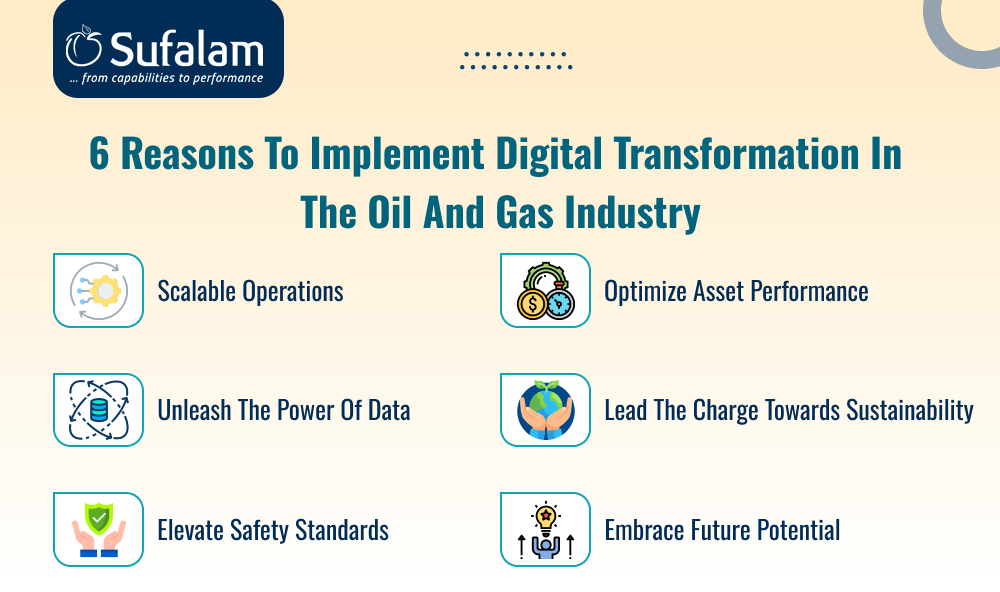
The benefits of digital transformation for the oil and gas sector are numerous; here are some compelling reasons for joining the trend in the volatile digital map space.
Scalable Operations
Digital transformation revolutionizes traditional oil and gas operations by streamlining processes, automating workflows, and optimizing resource allocation. This not only boosts operational efficiency but also unlocks new levels of productivity and cost savings across the entire value chain.
Unleash the Power of Data
By harnessing the power of data analytics and artificial intelligence, digital transformation empowers decision-makers to extract actionable insights from vast amounts of operational data. This data-driven strategy makes it possible to gain a competitive edge in the marketplace.
Elevate Safety Standards
Digital transformation introduces cutting-edge technologies such as predictive analytics, IoT sensors, and real-time monitoring systems to enhance safety protocols and risk management practices. Businesses can maintain industry-leading safety standards, save the environment, and protect the health and welfare of their employees.
Optimize Asset Performance
Through the creation of digital twins—virtual replicas of physical assets—digital transformation empowers operators to optimize asset performance and maximize operational uptime. By continuously monitoring asset health and predicting maintenance needs, O&G industries can drive higher returns on investment.
Lead the Charge Towards Sustainability:
Oil and gas companies can take the lead in promoting sustainability and environmental responsibility thanks to digital transformation. They can reduce their carbon footprint and mitigate environmental risks by implementing digitalization in oil and gas industry.
Embrace Future Potential:
In an era of rapid technological advancement, digital transformation in oil and gas enables the agility and adaptability required to thrive in a changing industry landscape. By embracing digital technologies, O&G sectors can stay ahead of the curve by navigating market uncertainties with confidence.
Guide to Leveraging Digitalization in Oil & Gas Industry
Here's a comprehensive guide on harnessing digitalization in oil and gas industry effectively. Hire dedicated developers from a digital transformation company to unlock new growth opportunities, and remain competitive in a rapidly evolving digital landscape.
- Evaluate existing technology infrastructure and capabilities.
- Set clear goals aligned with business strategies, such as improving efficiency or enhancing safety.
- Implement robust systems for collecting, storing, and analyzing operational data.
- Deploy IoT devices for real-time monitoring and leverage cloud solutions for scalability and flexibility.
- Prioritize cybersecurity measures to protect digital assets and infrastructure from threats.
Conclusion:
In conclusion, the digital transformation in the oil and gas industry is not just a trend but a fundamental shift that is reshaping the future of the sector. It presents unparalleled opportunities for companies to enhance operational efficiency without compromising on other crucial factors.
Whether to unleash the full power of digital transformation in retail industry or oil & gas, it's essential to partner with a trusted leader like Sufalam Technologies. With expertise in digital innovation and commitment to excellence, we provide tailored solutions to address the unique challenges and opportunities of various industries.
Frequently Asked Questions
What is digital transformation in the oil and gas industry?
Digital transformation in the oil and gas industry refers to the integration of digital technologies and solutions to streamline operations, improve efficiency, and drive innovation across the entire value chain.
2. What services does Sufalam Technologies offer for the oil and gas sector?
As a leading digital transformation company, we offer a wide range of services tailored to the oil and gas industry, such as digital strategy consulting, technology implementation, software development, data analytics, cybersecurity, and employee training and support.







